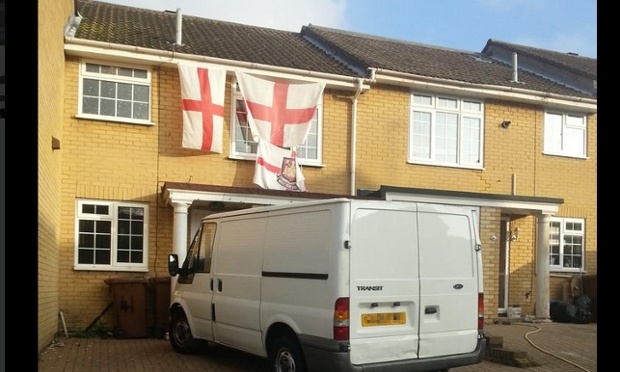It’s time to address the elephant in the van. I think you know what I mean. The unmentionable issue of why working people in Britain remain the object of sneering indifference for so many in the comfortable political class.
Well, it was unmentionable until Labour MP Emily Thornberry, hardly a household name (perhaps even in her own household), chose to draw it to national attention. Her tweet showing a terrace house decked in England flags set behind a white van sparked a political bonfire in the wake of the Rochester and Strood by-election.
It has burned slowly on ever since.
Thornberry was quickly sacked as shadow attorney-general and forced to apologize. She did so in front of her four-storey Islington townhouse with the shocked, sad face of a puppy that had just run into a mirror.
Labour leader Ed Miliband was equally contrite and insisted: “I’m afraid her tweet conveyed a sense of disrespect.
“That’s not my view, that’s not Labour’s view, it’s wrong, it never will be our view, and that is why I think it is right that she resigned.”
Pushed for a response as to what he thought when he sees a white van outside a house, Mr Miliband replied: “What is going through my mind is respect.
“Respect is the basic rule of politics and I’m afraid her tweet conveyed a sense of disrespect. There is nothing unusual or odd, as her tweet implied, with having an England flag in your window.”
Got it, Ed. Respect. Or as Aretha Franklin and her backup singers would have put it in 1967: “R-E-S-P-E-C-T… Sock it to me, sock it to me, sock it to me…”
Sock it to Labour indeed.
The problem for the once proud party of the workers is simple. That van could have been one of tens of thousands across the country owned by a working man or woman.
Doubtless the sort of person not privileged to be drawing their pay inside the Westminster bubble, perhaps one of the UK’s growing number of self-employed.
According to a report released in August by the Office for National Statistics (ONS) self-employment is currently at its highest level since records began almost 40 years ago.
Construction and carpentry ranked among the most common jobs along with taxi-driving. There are 4.6 million people working for themselves in the UK, with the proportion of the total workforce self-employed at 15 percent compared with 13 percent in 2008, and 8.7 percent in 1975.
These are people making their own way in life. They might have a van, ambition and an idea. Off to work they go.
They also have good reason not to look to somebody else to provide for them because of the steady decline in real wages.
In January the ONS revealed that “real pay” has fallen 2.2 percent on average since the Coalition took power.
That is part of a consistent fall since 2010, the longest period of decline since records began in 1964.
Compare and contrast that thinning pay packet with the following ONS data:
Real pay grew by 2.9 percent in the 1970s and 1980s, 1.5 percent in the 1990s, 1.2 percent in the 2000s and by minus 2.2 percent since the first quarter of 2010.
Such is the reality of modern Britain.
You work just as hard as you ever have to provide for your family but at the same time your ability to provide is eaten away by the decline in spending power.
The report, which weighed average weekly wages against rising prices, blamed the wage squeeze on workers’ hours being cut and the growing number employed in service industries.
Correspondingly, better-paid jobs in manufacturing industries have fallen.
So it’s no wonder a white van is a sign of the times. Its owner once may have may enjoyed a secure job in manufacturing and is now prepared to join the service industries to get by.
Independence and self sufficiency sure beats the hell out of working for somebody else.
So let’s lift the rhetorical veil and find out who owns the white van pictured in the Thornberry tweet.
The Sun newspaper revealed that person as Rochester car dealer Dan Ware.
The paper helpfully published Mr Ware’s manifesto, his “no-nonsense plan for a better Britain”. It goes like this:
Welfare state: Work for four years after you leave school before you can claim benefits.
Immigration: Copy the Aussies. If people show up uninvited, send them back.
Transport: Public transport costs are too high. More investment in roads too.
Education: Better discipline. Kids are too mouthy now, not like when we had the cane.
Justice: Tougher sentences for murderers. And jail those who burn the poppy.
Taxes: A killer for self-employed people like me. Start-ups need more breaks.
OK. So its more stream of consciousness than well crafted political policy, but the notes Mr Ware strikes will resonate with plenty of other workers around the country.
Once they might have been seen as rusted-on Labour voters. Not any longer.
The appeal of UKIP is that these same people now have a voice and a presence in Westminster.
Which is lucky for them because competition for jobs in Europe’s strongest economy is as strong as ever.
On Sunday Home Secretary Theresa May told the BBC’s Andrew Marr that the government’s immigration target is “unlikely” to be met in 2014/2015.
EU migration has “blown us off course” from cutting net migration to below 100,000 before the general election, Mrs May said, adding by way of explanation that Britain’s strengthening economy had continued to attract people from across Europe.
This is at odds with David Cameron who in May said the net migration target was “perfectly achievable”.
Mr Cameron was wrong then. Don’t expect him to apologize anytime soon.
Sorry is as hard for this prime minister to say as it is for Ed Miliband to eat a bacon sandwich.

COMMENTS
Please let us know if you're having issues with commenting.